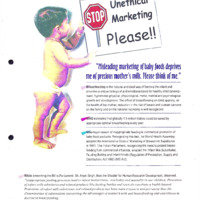STOP UNETHICAL MARKETING PLEASE
Item
- Title
- STOP UNETHICAL MARKETING PLEASE
- extracted text
-
SDA-RF-CH-1.41
Misleading marketing of baby foods deprives
me of precious mother’s milk. Please think of me."
Breastfeeding is the natural and ideal way of feeding the infant and
provides a unique biological and emotional basis for healthy child develop
ment. It promotes physical, physiological, motor, mental and psychological
growth and development. The effect of breastfeeding on child spacing, on
the health of the mother, reduction in the risk of breast and ovarian cancers,
on the family and on the national economy is well recognized.
estimates that globally 1.5 million babies could be saved by
appropriate optimal breastfeeding every year.
f.Qne major reason of inappropriate feeding is commercial promotion of
baby food products. Recognizing this fact, the World Health Assembly
adopted the International Code of Marketing of Breastmilk Substitutes
in 1981. The Indian Parliament, recognizing the need to protect breast
feeding from commercial influence, enacted the Infant Milk Substitutes,
Feeding Bottles and Infant Foods (Regulation of Production, Supply and
Distribution) Act 1992 (IMS Act).
While presenting the Bill in Parliament, Sh. Arjun Singh, then the Minister for Human Resource Development, observed,
"Inappropriate feeding practices lead to infant malnutrition, morbidity and mortality in our children. Promotion
of infant milk substitutes and related products like feeding bottles and teats do constitute a health hazard.
Promotion of infant milk substitutes and related products has been more extensive and pervasive than the
dissemination of information concerning the advantages of mother's milk and breastfeeding and contributes to
decline in breastfeeding."
Despite this, several companies manufacturing infant milk substitutes, feeding bottle and infant foods continue to market
their products using unethical promotional practices, to discourage mothers from breastfeeding, who thereby loose their
confidence and ability to breastfeed fully, resulting in early introduction of bottle feeding and commercial food.
This document shows examples of unethical advertisements.
Public Interest Brochure by BPNI
Companies use a variety of methods to induce people to use their products. Apart from the usual marketing techniques, they even give
false and misleading information and make false claims.
Unethical Practices: Misleading People
(Companies encourage starting cereals at 4 months age inspite of Govt. Of India and World Health Assembly advocating
exclusive breastfeeding till 6 months.
p
Their publicity makes tall health claims and indicates many nutritional benefits of cereals-all of which wrongly leads to
starting of cereals at too early an age.
The educational material brought out directly by the companies, or under their sponsorship, is often misleading and
undermines the importance of breastfeeding.
Schemes with free gifts or tied-up sales are very tempting and, again, promote early introduction of cereals.
o
Brand promotion through hoardings, shop sign-boards, sponsorships in magazines, radio & TV build an image of
trustworthiness that the companies exploit to their own advantage at the cost of the childrens’ health.
Public relations exercises such as sponsoring sports functions, distribution of relief materials during emergencies,
involvement on social issues, thereby projecting an image of being “good guys” whom people can trust.
e p^^beck<
CEO
n>onth’en Co,ls^iati
Publicly, they agree
with the breastfeeding norms,
and even bring out their own publications justifying
promotion of their products. And at the same time they continue to use
unethical marketing techniques that violate the IMS Act in spirit and in letter.
The Internationally accepted recommendations and the Government of India’s policy are
quite clear. And Nestle agrees. But their publicity continues to be contrary to their own words.
Even though the IMS Act clearly prohibit incentives to
medical professionals, Companies continue to sponsor
events for doctors, nurses and para-medicals.
Hoardings are prohibited under the Act but
Companies get around this by putting up
boards at Chemists’ shops.
27111 JULY 2002 (Saturday)
;,„f
9 00 P. U
M<?’el UME0 BHAWAN PALACE 1P.Uac.R05,
Free Gifts to Induce Sales
FREE
/
50g Johnson's
baby soap,
with every
BRrT
Cerelac
et hdo opt tins & nro
Now glowing skin
with Cerelac
Nutrition.
The attraction of nutrition and good
health offered in these advertisements,
coupled with the inducement of
free gifts, lure mothers away from
free(
breastfeeding.
Cerelac
wp
’
ri"w iu jra>
i fX? sstwi 11 v
i <rr jl ra frrj 577
I
Brand Buildina
I
Promotion of “nutritious” milk for older
children, is used as a brand building
exercise to extend the same virtues to
infant foods, thereby discouraging
breastfeeding.
nMft J/t? flerfinrjfl fmn pu
Jrfl fl flfl X. ifiitev <fl imdt
trsrz n jhv. sfl
To stop these unethical practices, you can help.
What you can do today...
□
Write to manufacturers of infant foods to stop their
unethical marketing practices. Addresses are given
below.
■
Spread the message and tell more people to voice
their protest to the companies.
If we all join hands,
we can force the
companies to
abandon their
unethical practices.
/
Ll
Wherever and whenever you spot instances of
violations of the IMS Act, bring it to the notice of the
authorities. Do not worry about retaliatory measures.
□
Write to the Government authorities to seek and
disseminate correct and scientific information on
breastfeeding and infant & child feeding.
Addresses of Infant Food Manufacturers
Nestle India Ltd.
7th Floor, DLF Centre
Parliament Street
New Delhi-110 001
Daimia Industries Limited
Ghana-Sewar Bypass Road
Bharatpur321 001
Rajasthan
Alferez Pvt. Ltd.
25/3 Suvernpuri Society
Chikkowadi
Vadodara 390 007
Heinz (India) Pvt. Ltd.
D. Shiv Sagar Estates
Worii, Mumbai 400 025
Wockhardt Ltd.
Dr. Annie Besant Road
Worii, Mumbai 400 018
Gujarat Cooperative Milk Marketing
Federation Ltd., Anand 388 001
Gujarat
For more information write to BPNI.
Breastfeeding Promotion Network of India
BP-33 Pitampura,
Delhi 110088.
Tel:+91 (11) 7312445
Fax:+91(11) 7315606
Email: bpni@bpni.org
Website: www.bpni.org
Please send BPNI a copy
ofyour letter to the companies.
- Media
 SDA-RF-CH-1.41.pdf
SDA-RF-CH-1.41.pdf
Position: 3118 (3 views)
